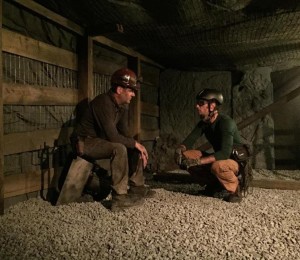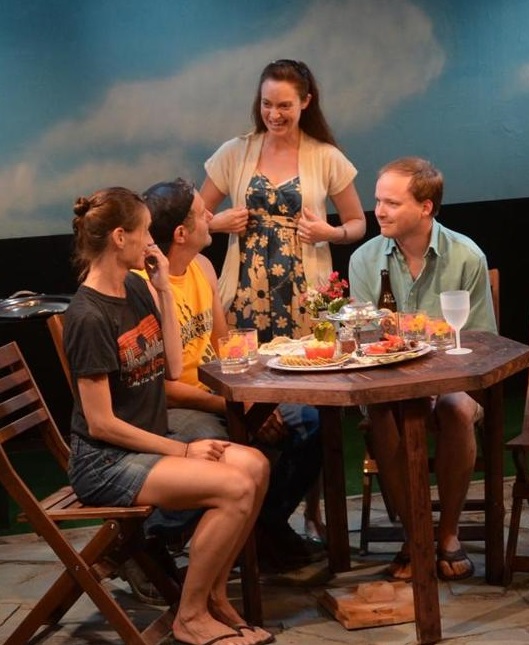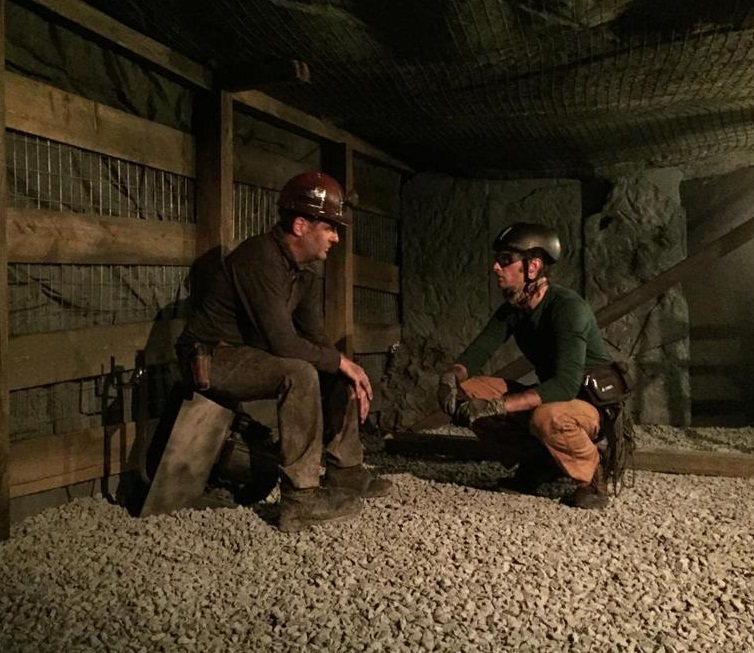My partner and I spend a week on Cape Cod each summer, and while the beach is restorative, for me the trip is also a very welcome busman’s holiday. By sheer good fortune, the timing of our visit allows us to catch two productions by the hands-down hottest professional summer theater on the Cape.
That’s Harbor Stage Company, an adventurous artist-led collaborative that presents small, smart plays for a smart audience in its small dockside home in Wellfleet. (The $20 tickets are also smart: making theater affordable for all.) The key partners are a quartet of extraordinary actors who often create or commission work for themselves – which was the case with the first show I saw there this month – or choose vehicles that showcase their talents, as with their current offering.
Detroit, playing through September 5th, is a contemporary piece for four characters (plus one last-scene cameo). I have no idea why it’s called Detroit, since its setting isn’t specified and it’s not about the Motor City, but suburbia – in this case, a paradise lost.
 Lisa D’Amour’s heartbreaking comedy is set in two adjoining backyards, one a neat patio furnished with an umbrella’d picnic table and a big gas grill, the other a wasteland behind a dilapidated old house. (Sara C. Walsh’s set makes it just about work on the theater’s tiny stage.) This contrast is mirrored in the two couples who occupy the houses, and then refracted as their apparent differences begin to mingle and dissolve.
Lisa D’Amour’s heartbreaking comedy is set in two adjoining backyards, one a neat patio furnished with an umbrella’d picnic table and a big gas grill, the other a wasteland behind a dilapidated old house. (Sara C. Walsh’s set makes it just about work on the theater’s tiny stage.) This contrast is mirrored in the two couples who occupy the houses, and then refracted as their apparent differences begin to mingle and dissolve.
Mary and Ben, the patio owners, are stolidly middle class, she a paralegal, he setting himself up as a financial advisor. On the other side of the fence are Sharon and Kenny, both fresh out of rehab and working in unskilled jobs. Their attempt to emulate Ben and Mary’s Whole Foods hospitality is laughably gauche, but meanwhile it transpires that Mary has a drinking problem and Ben’s work ethic is shaky.
The play is an engaging if sometimes heavy-handed metaphor of the American Dream’s crisis of faith, an edgy elegy for the loss of community – that is, the artificial village that tract housing was supposed to create – which slowly turns from satiric to surreal. But it’s above all the performances that make it a late-season must-see. Brenda Withers, as Sharon, has the juiciest role, compulsively talkative, carelessly obscene and unselfconsciously goofy. She’s more quietly matched by Stacy Fischer as Mary, tight-lipped and tight-assed, not counting a hilariously sad drunk scene. Robert Kropf’s Kenny is laid-back, sardonic and surprisingly grounded. And Jonathan Fielding gives a prophetically panicked look to Ben’s hearty demeanor.
Allen Kennedy makes a brief, plot-wrapping appearance with a performance that’s more than adequate but suffers by comparison to those of the core quartet. If their individual work is arresting, the ensemble is greater than its sum. It’s pure pleasure watching these four interact so organically, building on each other’s strengths and shining in each other’s light.
Light was the key ingredient in the previous Harbor Stage production, Northside Hollow. An original script by Fielding and Withers, it grew out of a unique audience-participation concept. It takes place in a mineshaft, sealed off by a coal-dust explosion, where a lone miner awaits rescue. He’s visited by a volunteer responder and then by his ex-wife – by which time we realize they both live in his imagination as he lies dying.
In a tour-de-force, near-motionless performance, Kropf gave the doomed miner an affecting blend of fear-laced bravado and ironic humor. He was joined by Withers and guest performer Alex Pollock, as well as by a half-dozen audience members. These volunteers were equipped with headlight-mounted helmets which gave flickering illumination to the set and actors that shifted depending on where each of them happened to be looking.
The situation depicted in the play at first seemed to have little to do with the lighting gimmick, and then everything to do with it. It made us all present in the man’s claustrophobic tomb and part of his experience. No bright light at the end of the tunnel for this sinner, just wavering lights that illuminated his dying meditations partially and unreliably.
Like Detroit, this is a play built on a metaphor whose strands slowly merge together. It’s a work rich in ideas and dramatic invention, and I hope the company will keep it in their repertoire.
Photos by Sara C. Walsh and Jonathan Fielding.
If you’d like to be notified of future posts, email StageStruck@crocker.com




